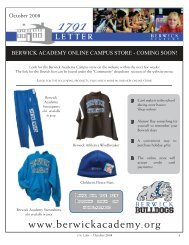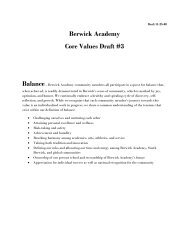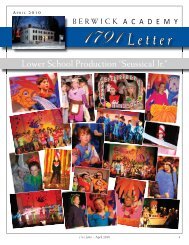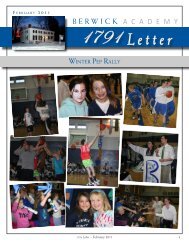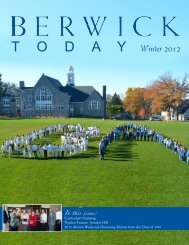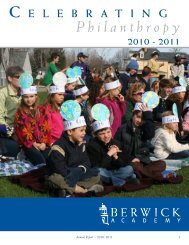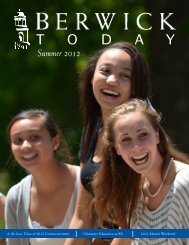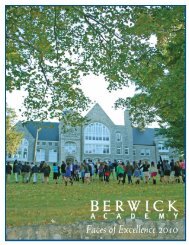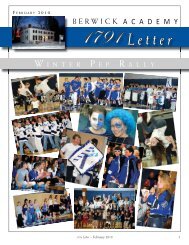June 2009 1791 Letter - Berwick Academy
June 2009 1791 Letter - Berwick Academy
June 2009 1791 Letter - Berwick Academy
You also want an ePaper? Increase the reach of your titles
YUMPU automatically turns print PDFs into web optimized ePapers that Google loves.
SOMETHING TO THINK ABOUT<br />
OVER THE SUMMER<br />
I thought it would be fun to<br />
end the school year by hearing from<br />
someone other than me, so I invited the<br />
members of the “new” Support Services<br />
Department at <strong>Berwick</strong> <strong>Academy</strong> to<br />
assist with the writing of my <strong>June</strong> <strong>1791</strong><br />
<strong>Letter</strong>. The department was created this<br />
year and is headed up by yours truly.<br />
Its members include Ben Hillyard,<br />
Lower School Academic Support<br />
Coordinator; Stacey Sevelowitz,<br />
Middle and Upper School Academic<br />
Support Coordinator; and Linda Gill,<br />
School Nurse. It is my hope that by<br />
bringing these professionals together<br />
and creating this new department,<br />
<strong>Berwick</strong> <strong>Academy</strong> can provide more<br />
coordinated and comprehensive<br />
medical, academic, and psychological<br />
support for your child during the<br />
school year. We know through years<br />
of experience that a happy, healthy<br />
child thrives academically. So, for my<br />
fi nal <strong>1791</strong> of the academic year, I posed<br />
the following question to each of the<br />
members, “What is one thing that you<br />
want <strong>Berwick</strong> parents to remember<br />
while enjoying summer vacation with<br />
their children?” As you will see, our<br />
responses are specific to our particular<br />
area of expertise. I hope you find the<br />
advice helpful!<br />
Ben Hillyard - Lower School Academic<br />
Support Coordinator<br />
Something to Think About Over the<br />
Summer – SUMMER LEARNING IS<br />
ESSENTIAL AND CAN BE FUN!<br />
First, let me congratulate the<br />
Lower School students on a wonderful<br />
year. This school year was packed<br />
full of opportunities for learning,<br />
development and growth from the first<br />
days of Kindergarten to the excitement<br />
and fear of moving up to the Middle<br />
School.<br />
The Lower School strives<br />
to develop an education foundation.<br />
Elementary School could be<br />
considered the mortar that connects<br />
future academic building blocks. It is<br />
the task of both the home and school<br />
environments to develop a foundation<br />
which is strong, adaptive and rewarding.<br />
So where does summer vacation fit into<br />
this complex formula? Should summer<br />
learning opportunities mirror the rigors<br />
of a day of school or should summer be<br />
about rest and relaxation?<br />
Let’s look at the research for a<br />
defi nitive answer. After a brief survey<br />
I found that some research states that<br />
only math computation regresses over<br />
the summer months. Unfortunately,<br />
other research states that summer<br />
regression is rampant and one of the<br />
main reasons for our diminishing<br />
United States achievement scores<br />
as compared to other industrialized<br />
countries. Still other research states that<br />
summer school is crucial to long term<br />
retention, fluency, and comprehension.<br />
To complicate things still further,<br />
there are theoretical grounds (Dewey,<br />
1956) for supposing that children learn<br />
academic skills effectively outside<br />
school. If so, far from there being<br />
summer losses, there may even be<br />
summer gains (Wintre, 1986).<br />
It is unquestioned that children<br />
can grow emotionally, physically and<br />
academically in the summer.<br />
Well, this leads us back to<br />
the needs of the individual. I would<br />
argue that adapting the research to the<br />
individual needs is the art of teaching,<br />
but should be in collaboration with<br />
parents. Maintaining motivation is a<br />
fl uid dynamic and every technique<br />
does not help every child.<br />
I would conclude with these<br />
basic recommendations:<br />
• Ask your child’s teacher for<br />
recommendations. In the Lower School<br />
our homeroom teachers understand<br />
your child’s strengths, learning style,<br />
and specifi c challenges.<br />
• Break it down to its simplest form<br />
- require some but make it fun. The<br />
relaxed exploration of a beach or tide<br />
pool can lead to new discoveries and<br />
certainly learning. Learning happens in<br />
all aspect of their lives.<br />
Stacey Sevelowitz - Middle & Upper<br />
School Academic Support Services<br />
Something to Think About Over the<br />
Summer – AVOID BRAIN DRAIN!<br />
As the lazy days of summer<br />
approach, try to remember the old<br />
saying, “Use it or lose it!” Indulging<br />
in the temptation to do nothing over<br />
the summer to boost your brain power<br />
is a wasted opportunity! According to<br />
www.sharpbrains.com (a leading market<br />
research company focused on the brain<br />
fi tness and cognitive health market), a<br />
very repetitive and routine-driven life,<br />
lacking in novelty and stimulation,<br />
can lead to brain drain. Brain research<br />
shows that intelligence is not fixed as<br />
previously thought; rather, the brain<br />
continued on pg 16..<br />
12 <strong>1791</strong> <strong>Letter</strong> ~ <strong>June</strong> <strong>2009</strong>



